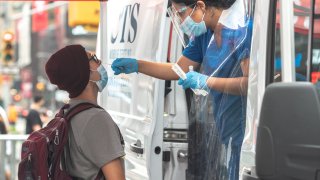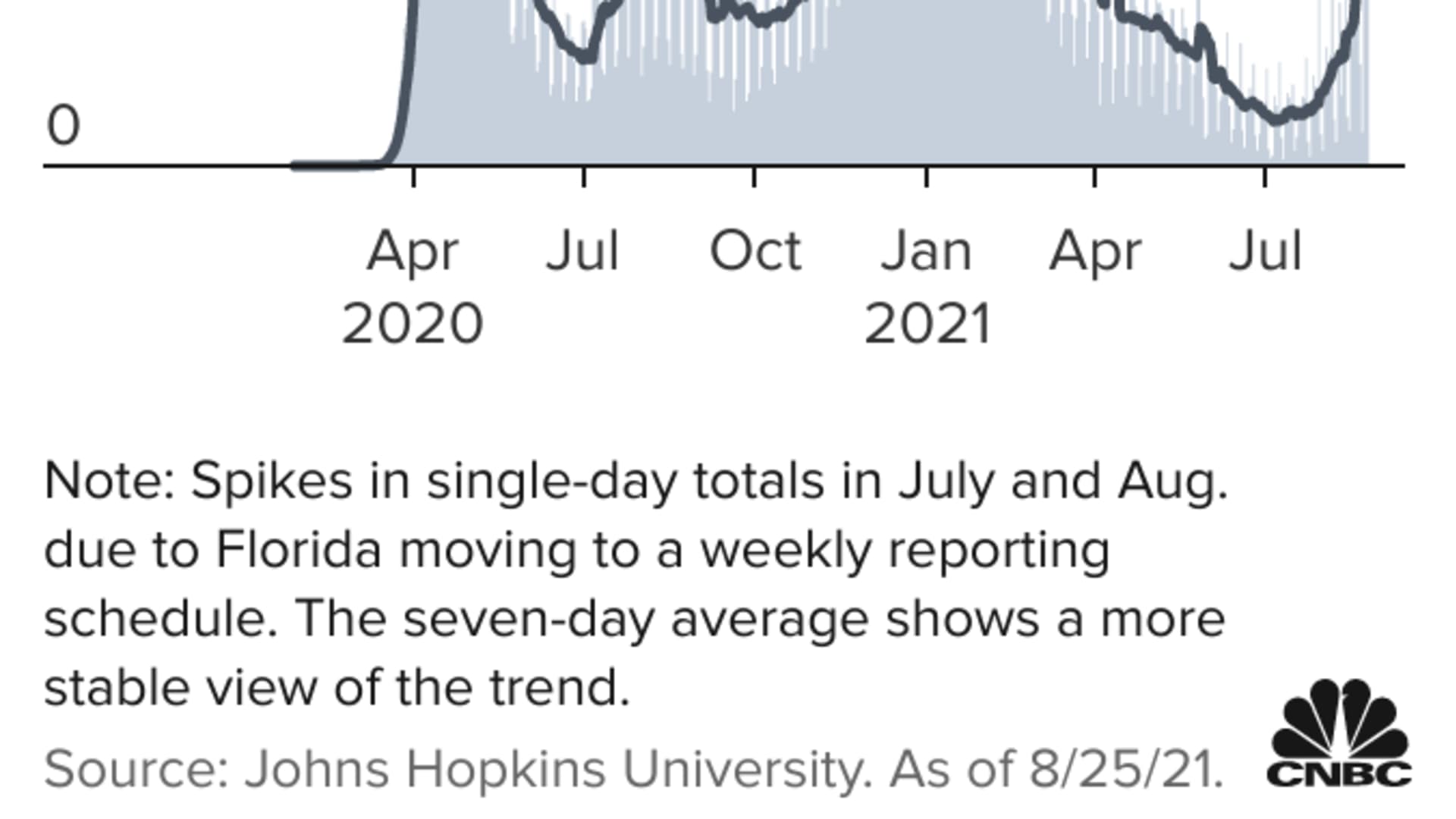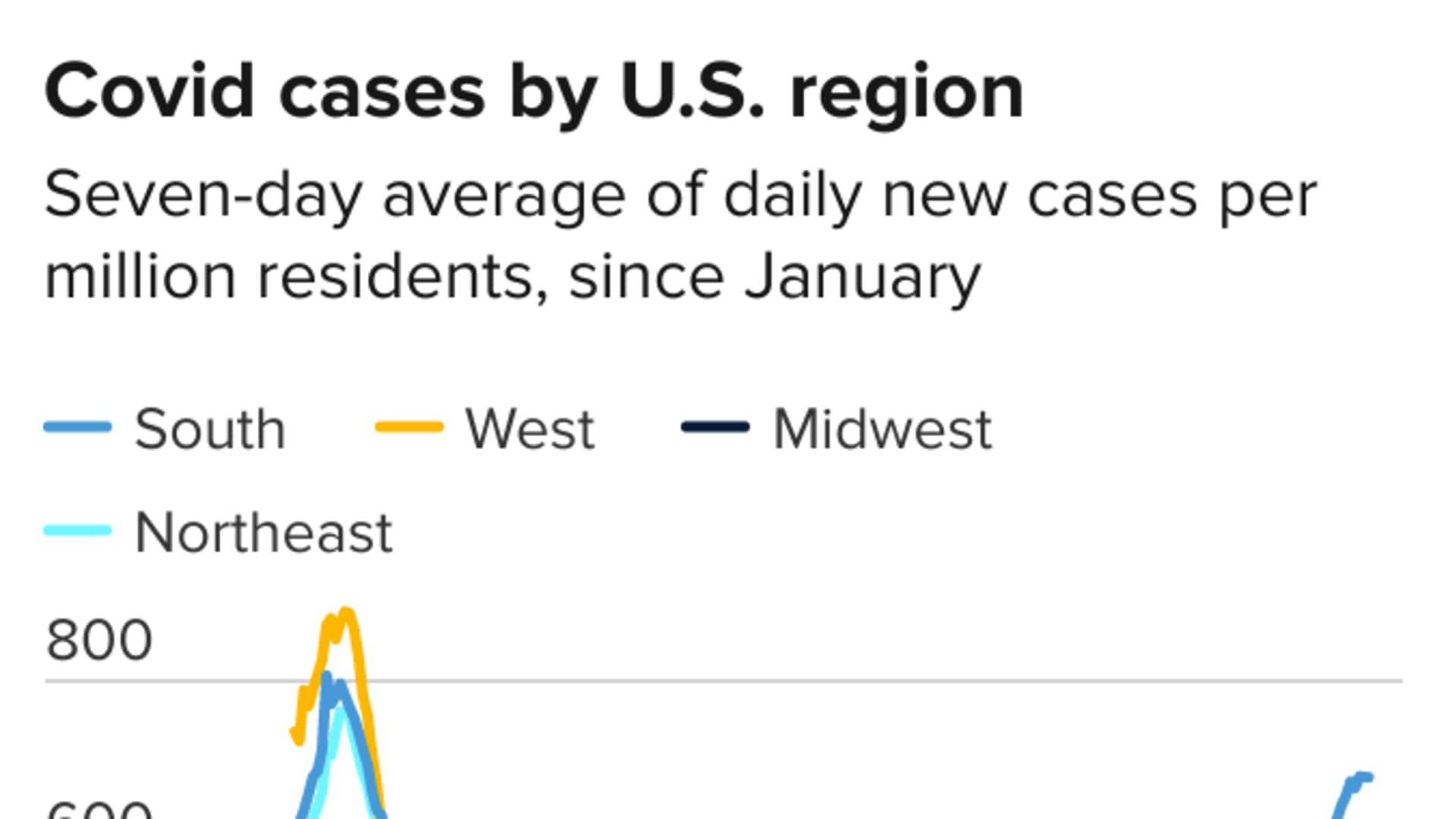
- The seven-day average of daily new Covid cases crossed 152,000 on Wednesday, data compiled by Johns Hopkins University shows, an increase of 11% from the prior week.
- The country was reporting much steeper weekly increases of more than 30% just two weeks ago.
- Average case counts are down or flat over the past week in some of the states hit hardest by the delta variant, including Louisiana, Missouri and Florida.
- Hospitals in hard-hit states are still strained and death tolls are on the rise.
Covid cases are still on the rise in the U.S., but the pace of infections is showing signs of slowing, especially in some of the states that have been hit hardest by the delta variant.
Though cases have climbed to their highest level since January at an average of 152,000 per day over the last week, the pace of the rise in new infections has substantially slowed over the last two weeks, data compiled by Johns Hopkins University shows. New cases increased by 11% over the last week, almost a third of the seven-day jump of 30% just two weeks ago, according to the data.
Get Tri-state area news and weather forecasts to your inbox. Sign up for NBC New York newsletters.
A combination of the elevated level of recent cases along with the number of Americans who are vaccinated means the virus may now be finding fewer people to infect, according to Dr. Bruce Farber, chief of infectious disease at Northwell Health in Manhasset, New York.
"All outbreaks have these peaks, and then as the percent of the population both gets infected as well as vaccinated, and it can be a combination of those things, you run out of fuel," he said. "And in this case, the fuel is unvaccinated and uninfected people."

The U.S. has seen a handful of peaks in cases throughout the course of the pandemic. Average daily cases topped out at about 32,000 in April 2020 before subsiding and then resurging to a new peak averaging 67,000 per day in July 2020. Many were hopeful the pandemic was contained last fall as average daily cases fell to around 34,000 just after Labor Day 2020 before the fall and winter holiday season drove a surge of Covid cases to a seven-day average of 251,000 cases per day in January. There was a steep drop-off after the holidays before the alpha variant from the U.K. started to drive another surge in cases in the U.S. to an average of 71,000 cases a day this last April.
Money Report
Even if cases are nearing a new peak, it may still be some time before that's apparent at local hospitals. Hospitalizations and deaths tend to lag case counts by a couple of weeks or more, as it takes time for people to become infected with the virus and then become sick enough to need urgent care.
The curve in nationwide hospitalizations may be bending. An average of more than 12,200 Americans were admitted to hospitals with Covid each day during the week ended Aug. 23, Centers for Disease Control and Prevention data shows. That's an increase of 6.6% from the week before, a smaller jump than has been seen in recent weeks.

The death toll, on the other hand, is still rising at a fast pace. Johns Hopkins data shows the country's count of average daily deaths surpassed 1,100 as of Wednesday, up 39% from a week ago, driven by large and quickly rising fatalities reported by Florida, Texas, Louisiana and Georgia.
Some of the states that experienced the earliest impacts of the delta variant's spread are seeing cases decline or flatten out.
Louisiana, which had been leading the country in the number of population-adjusted daily cases for weeks until being surpassed by Mississippi recently, is now seeing some signs of relief. The state is recording a seven-day average of about 4,700 daily cases, down 10% from a week ago and 20% from its peak level of about 5,800 daily cases 10 days ago.
Alyson Neel, spokeswoman for the Louisiana Department of Health, said it's too soon to know whether the outbreak in Louisiana has reached its peak.
"We can't ignore that there's some daylight in the cases, can't ignore that there's been at least several days now of decreased reports of Covid cases, and that's really good," Neel said.
"I don't know if we'd say we know whether or not we've peaked, but we sure are grateful for the small downtick in cases," she added.
Though slowing case counts may indicate that the delta surge is finally approaching its apex, many states still face a flood of hospitalizations and deaths. The 139 deaths reported in Louisiana on Aug. 24 is the highest single-day total over the course of the pandemic, according to Johns Hopkins data.
Just under half of Louisiana's intensive care beds were occupied by Covid patients as of Thursday, compared with 30% nationwide, according to the U.S. Department of Health and Human Services. The surge is taxing health-care systems in Texas and Florida as well, where more than 50% of ICU beds are currently treating coronavirus cases, according to HHS.
"I certainly would hope that people don't take declining case rates as a sign that we are truly out of the woods," Dr. Barbara Taylor, an assistant dean and infectious disease professor at the University of Texas Health Science Center at San Antonio, told CNBC. "There are so many other factors that we have to consider about how much strain this is putting on all of our systems and all of our health-care systems."
Texas is recording an average of 16,970 daily cases, up 10% over the past week. That's below the state's record high of more than 23,000 daily cases set in mid-January, and showing some signs of easing, but the daily death toll in Texas has nearly quadrupled this month to an average of 153 per day.

In Florida, which is responsible for roughly 1 in 7 new U.S. cases, infection levels are more or less flat over the past week, though they are at pandemic highs. The state, which stopped reporting daily case numbers in May, said it had 150,740 new infections as of Friday, compared with 151,764 the prior week, and hospitals are strained to the point that the mayor of Orlando asked residents last week to cut back on water usage in order to preserve resources needed to combat the recent surge of Covid hospitalizations.
Florida's fatalities, meanwhile, have climbed to a new seven-day peak of 1,486 deaths — its highest weekly total of the pandemic.
In Missouri, which saw a surge in cases starting in early July, daily cases have tumbled by 10% over the past week to an average of about 2,400 per day. But deaths are rising there, too, up 36% over the past week to an average of 35 daily deaths.
Infectious disease experts say the return to in-person learning for school and university students will pose another hurdle to slow the spread, with the potential for localized outbreaks this fall. However, there is a playbook for fighting the virus at this point in the pandemic, Taylor said.
"I think the answers are the same answers that they've been for a while: getting more people vaccinated, providing more access to vaccination for more people, and easy access to mobile clinics," she said, adding that masking and social distancing from those in different households are still important tools.
"We know ways that we can reduce risk or mitigate risk both in schools and in work environments," Taylor said. "But I think that in some places, that is going to be really challenging, and there is wide variation in practices within schools."






